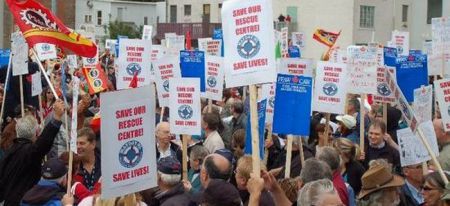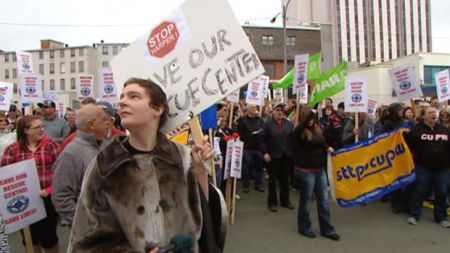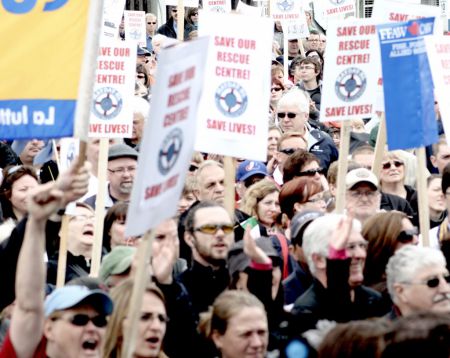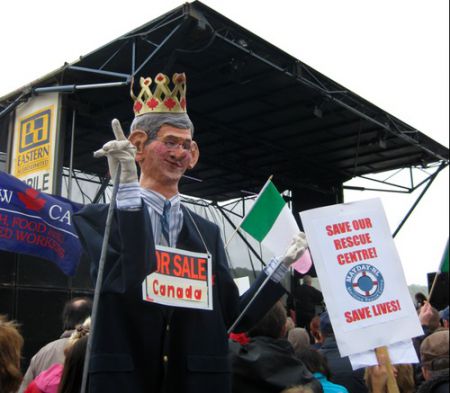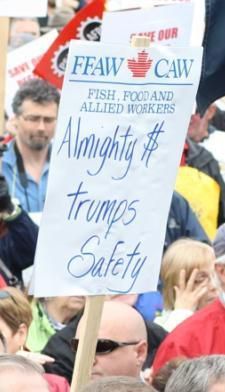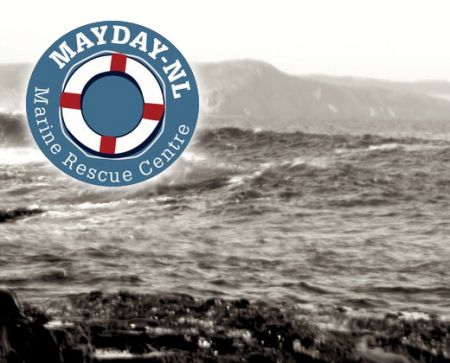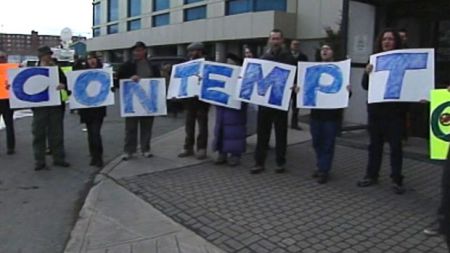(June 28, 2011, revised June 29) – BETWEEN 2,500 and 3,000 Newfoundlanders participated in a vigorous rally Saturday, June 25th, on the St. John’s waterfront against the decision of the Harper government to close the Marine Rescue Centre.
The “mayday” [1] demonstration united workers and Newfoundlanders from all walks of life and political affiliation against the Harper government’s wrecking of the Marine Rescue Centre. The demonstration was organized by a coalition headed by labour unions such as the Fish, Food and Allied Workers (CAW), Union of Canadian Transportation Employees, Public Service Alliance of Canada, Canadian Union of Postal Workers, and the Newfoundland and Labrador Labour Council.
Banners and placards read: “Canada is Not for Sale!”, “Our Safety is Not for Sale!,” “Almighty Dollar Trumps Safety,” “Come Fishing With Me, Harper,” “Harper, Out to Destroy Newfoundland,” and “Shame on You Harper!” Fishermen also brought zodiacs and other boats into the harbour to participate in the rally.
The rally was addressed by Liberal Leader Yvonne Jones; Randy Simms, mayor of Mount Pearl; Conservative Fisheries Minister Clyde Jackman; NDP provincial party president Dale Kirby; and Jeannie Baldwin, Atlantic regional vice-president for the Public Service Alliance of Canada, news agencies report.
Dennis O’Keefe, mayor of St. John’s, started off the rally. “What this man needs to understand, and what they need to understand in Ottawa, is that we are a people who are tied to the ocean. My fear is that this is the beginning of a tidal wave of protest that will roll across this country in the coming years as the Harper government tries to turn back all of the progress that we’ve made here in this country.”
In his speech Dale Kirby referred to the crash of the helicopter Cougar Flight 491 of March 2009 in his speech, referencing the recommendation by Judge Robert Wells to increase Search and Rescue measures for the province’s offshore. “Stephen Harper’s short-sighted, unthinking decision flies directly in the face of that recommendation.”
The rally included a large contingent of 350 members of the Public Service Alliance of Canada, the union representing the 12 sub-centre workers. PSAC’s Jeannie Baldwin said the Conservatives have “gouged” the number of federal government positions in the province.
The decision to cut the Marine Rescue Centre is said to be part of a $56 million cut in funds of the Department of Fisheries and Oceans (DFO) mandated by the Harper government which claims these cuts are necessary to bring down the deficit and guarantee economic recovery. These cuts are not only gutting public services but corporatizing and privatizing the fisheries and oceans to enrich private monopolies, including the foreign fisheries, shipping and oil fleets. They also serve to further annex Canada's resources and assets to the U.S. which claims the earth, sea and space as its own.
The case of the Marine Rescue Centre reveals once again the arrogance with which the Harper government is dismantling everything that falls within the purview of the public interest. This includes citing his Royal Prerogatives and those of his ministers. In dismissing the just concerns of Newfoundlanders, Minister Keith Ashfield, Minister of Fisheries, ACOA and the Atlantic Gateway, derisively termed the Marine and Rescue Centre as just another call centre. Harper reportedly cut short a phone call of protest from Conservative premier Kathy Dunderdale, who did not contest Harper’s right to cut the centre but offered to co-fund the centre, just weeks after she unsuccessfully campaigned to deliver Newfoundland to Harper in the last election. (Just one Conservative was elected, in Labrador.)
The government is invoking a crisis in the budget to divert attention from the fact that its offensive to pay the rich is an offensive to dismantle all public infrastructure and responsibilities. Necessarily, it directs its attacks on the public services and those workers who maintain them.
In an interview with CBC news on June 27th one day after the passage of the back-to-work legislation against the postal workers, Minister Ashfield claimed “people have the absolute right – we live in a democracy to demonstrate if they're not happy with decision.”
The essence of the matter is precisely who has the right to make the decision to cut a Marine Rescue Centre which the people of the region think is essential to their well-being. According to the arrogant Harper government, the “prerogatives” and majority government status give his government that right. The crucial matter of the people’s right to safety and security and to decide what is in their interests is simply subordinate to whatever the Harper government “believes.” They can make whatever decision they want and answer only to the financial interests which they serve, not the people.
Not surprisingly, Ashfield claimed the decision was “fiscally responsible” and a “tough decision” based on “a strong mandate from the Canadian taxpayer in terms of money and getting our books back in balance.”
The DFO rationale is that calls will be allegedly handled out of Nova Scotia and Ontario following the closure of St. John's facility in June, 2012. How to best protect fishermen, seafarers and workers on the oil rigs and guarantee that they are protected is not a concern for the likes of these servants of monopoly right.
The opposition of the people to the closure of the Marine Rescue Centre was made all the more poignant since only a day before a man was pulled dead from the waters about 60 kilometres east of St. Anthony, on the northernmost tip of the island of Newfoundland. Four other men, who were working on a fishing vessel that was in distress, were rescued.
Not ten years ago, Environment Canada shut down the Newfoundland weather office and consolidated operations in Halifax. The Halifax office itself had to be evacuated during Hurricane Juan early in the morning of 1 October 2003; misleading weather reports were broadcast from Fredericton, itself scheduled for closure at the time. The alternative back-up centre for the entire Atlantic Canada region was located in Quebec.
According to the coast guard’s website, the Newfoundland and Labrador Region has the highest proportion of distress incidents in Canada. The site says the St. John’s rescue centre responds in an average year to approximately 500 incidents involving 2,900 people.
The coast guard says 28 per cent of those incidents are classified as distress calls, in which 600 lives are saved and 18 lives are lost, on average. The centre is responsible for 900,000 square kilometres of ocean and 28,956 kilometres of coastline.
When the Dominion of Newfoundland joined the Canadian federation in 1949, the new province turned over control of all its resources. Today we have a situation where Harper, who once claimed there was a “culture of defeat” in Atlantic Canada, runs rampant over the dominions where he has ordained he has the “mandate” to rule.
In its report on the parliamentary debate on the back-to-work legislation against the postal workers, TML Daily quite rightly pointed out on June 27th:
“One of the aims of the Canadian federation was to provide the same universal high standards for Canadians from coast to coast to coast. This is why public services were guaranteed irrespective of how remote a location was or due to income disparities. It is the workers who have been defending the principles on which the Canadian federation was established, not the government which is pursuing fundamental constitutional changes hidden behind claims it is protecting Canada's economic recovery. The government completely fails to address why Canada cannot have a sound economy while upholding the principles on which the federation was established.”
All of it shows that the constitutional crisis is going to deepen over federal/provincial power sharing. For some time the federal government has been destroying the livelihoods of local fishermen on the east coast in the name of upholding “conservation.” Now it has added “surveillance” to its list of righteous causes to deny the right of Canadians who work with the ocean to safety and security. [3]
The Harper government’s wrecking agenda is in contempt of all modern standards of public right, social responsibility and sovereignty. It is an authority in direct clash with the conditions which require that the people vest the decision-making power in themselves. The fact that participants in the rally came from all political persuasions also shows that, far from considering what the Harper government is up to a “right-wing agenda which clashes with a left-wing agenda,” it should be considered a criminal offence.
Endnotes
1. Mayday: Mayday is an emergency procedure word used internationally as a distress signal in voice procedure radio communications. It derives from the French venez m'aider, meaning "come help me." It is used to signal a life-threatening emergency primarily by mariners and aviators but in some countries local organizations such as police forces, firefighters, and transportation organizations may also use the term. The call is always given three times in a row (‘Mayday Mayday Mayday’) to prevent mistaking it for some similar-sounding phrase under noisy conditions, and to distinguish an actual Mayday call from a message about a Mayday call. (“Mayday,” Wikipedia, retrieved June 28, 2011.)
2. Mayhem: Mayhem is a criminal offence under the common law of England and Wales and other common law jurisdictions. It consisted of the intentional and wanton removal of a body part that would handicap a person's ability to defend himself in combat.
Under the strict common law definition, this required damage to an eye or a limb, while cutting off an ear or a nose was deemed not sufficiently disabling. Later the meaning of the crime expanded to encompass any mutilation, disfigurement, or crippling act done using any instrument.
In England and Wales, it has fallen into disuse. In 1992 the Law Commission recommended that it be abolished, and in 1998 the Home Office proposed to abolish it, in the course of codifying the law relating to offences against the person.
In modern times the word "mayhem" is often used to mean “havoc and disorder” [...]. (“Mayhem,” Wikipedia, retrieved June 28, 2011.)
3. “Surveillance” was the justification to use the DFO budget to carry out “conservation” (of fish stocks, fishing efforts, foreign fleets, monitoring oil polluters) for military purposes.
The government deployed amongst other things, AWACS – Aurora long distance surveillance planes purchased from the United States, the ill-fated Sea King helicopters and Iroquois class destroyers. All were acquired with the justification of high ideals. Operational cost items included in the annual budget of the DFO were used for military purposes, for instance, as part of the Cold War and anti-submarine surveillance on behalf of the United States and the NATO bloc. Canada’s annual military expenditures were much higher than those presented to the Parliament and the Canadian public in Department of National Defence (DND) estimates due to the para-military DFO budget.
With the emergence of the unipolar world led by the United States following the collapse of the Soviet Union, the Canadian Forces became part of its new arrangements, especially in the Middle East. The military instruments allegedly required for “surveillance” and “conservation” have been continuously redeployed by the Canadian government to protect multinational oil tankers in the “vital oil shipping routes” from the oil-rich Arabian peninsula through the Persian Gulf since the first Gulf War in 1991 throughout the entire decade of the 1990s to the Anglo-American invasion of Afghanistan (Canadian Forces Operation Apollo, announced October 8, 2001, included two Aurora maritime patrol aircraft, through October 2003), and the Anglo-American invasion of Iraq in 2003 (Enduring Freedom) to date.
In short, Canada actively participated in a war of aggression in violation of international law while selling out its own resources and territory at home. In the name of high ideals of “defence of the free world,” Canada abnegated the defence of its own coastline and coastal communities. No doubt shipments of the stolen Iraqi and/or Libyan oil will also soon be arriving at the East Coast refineries for processing.
See Tony Seed and Gary Zatzman, “REFLECTIONS ON THE PRESTIGE OIL DISASTER: (Part 3) ‘Don’t make me fish off Cape St. Mary’s’,” March 25, 2004
View an audio-photo flash show of the rally at The Independent
With files and photos from CBC St John’s, The Muse and The Independent
Tony Seed is a Halifax journalist and publisher and maintains a blog of his writing and related work at http://tonyseed.wordpress.com
